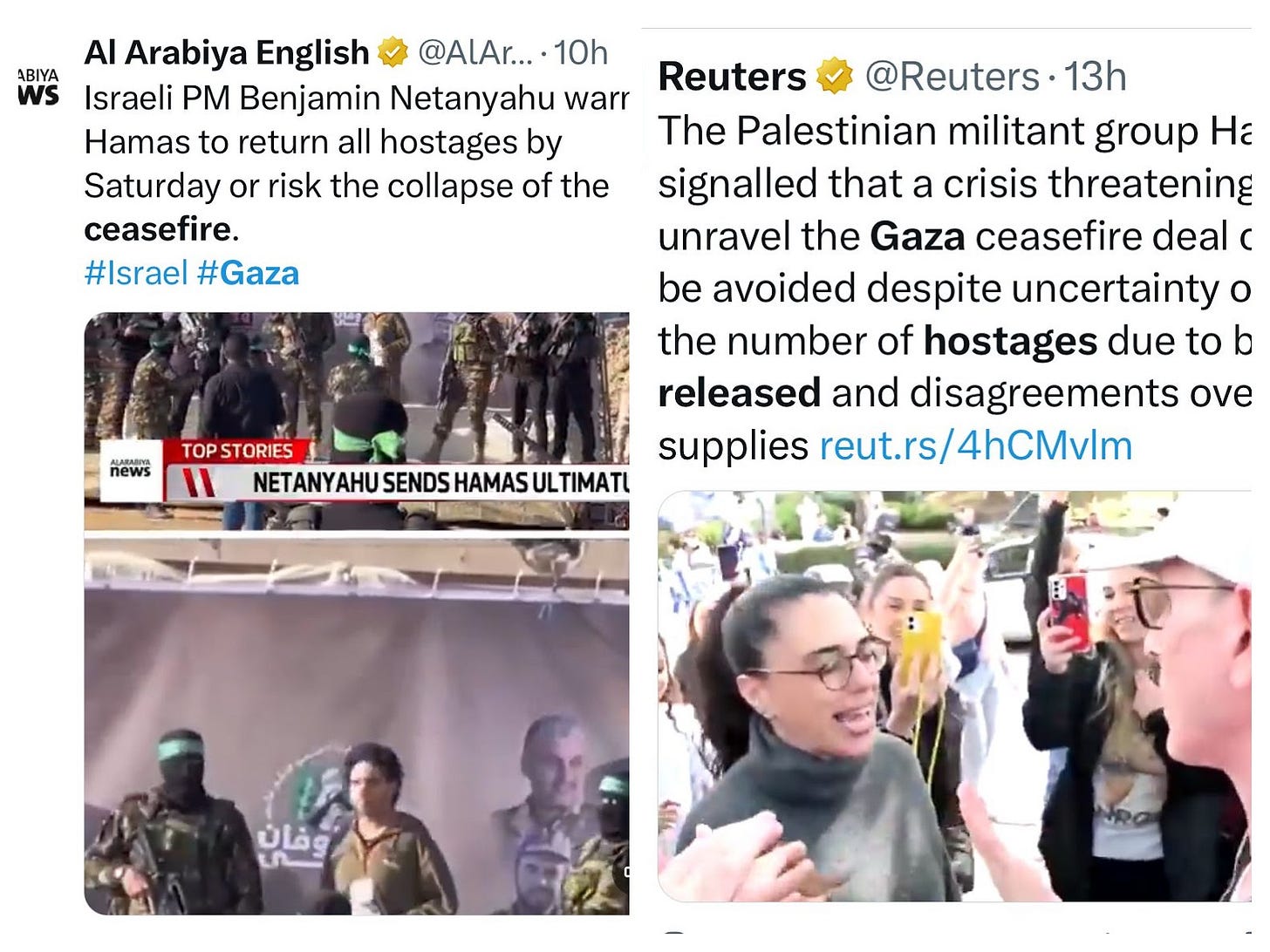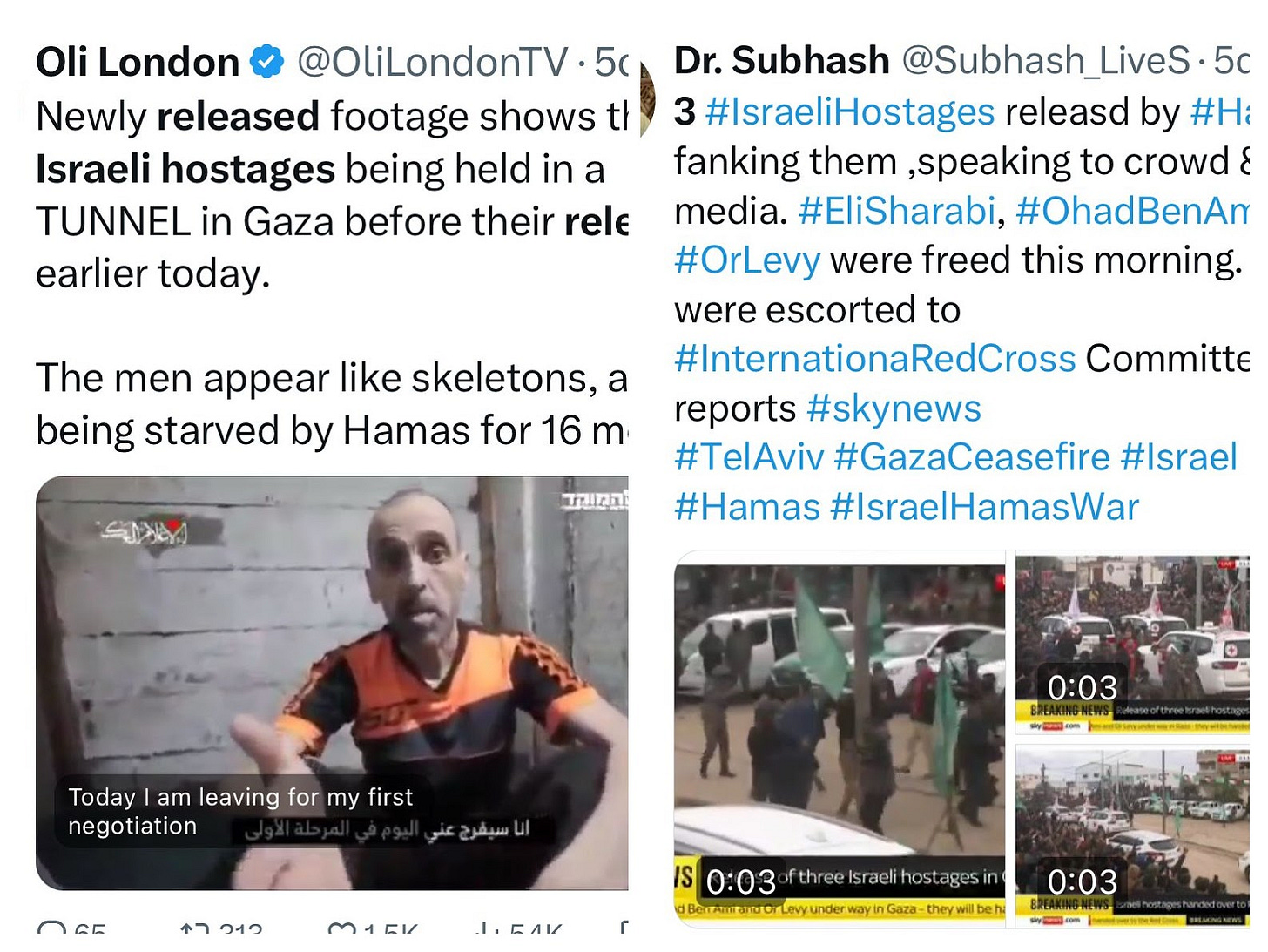Israel at War - Day 497
Gaza Ceasefire - Day 26
1. Crisis in Hostage Deal, Hamas Announces Break in the Deal, President Trump in an Ultimatum to Hamas
On Friday Hamas gave the names of three male hostages that should be released on Saturday, according to the signed deal.
Earlier this week, Hamas announced that it would not release the Israeli hostages, because Israel did not keep its part, and did not allow heavy equipment and trailers into Gaza, as agreed upon in the original deal, and due to that, the organization will not continue with the deal. More than 70 hostages are still held in Gaza, some of them are waiting to be released in the first phase of the deal, which includes the release of 33 Israeli hostages - living and dead. Among them are the body of an Israeli soldier who was killed during the military campaign in Gaza in 2014, and two other Israelis who entered Gaza ten years ago, out of mental health issues.
The crisis also included the fact that the negotiations on the second phase of the deal, which were due to start earlier this week, did not get underway.
Analysts understand that PM Netanyahu doesn’t want the second phase to start since that includes the end of the war. If that happens, key partner parties of his coalition will leave and this may put in danger the sustainability of the coalition. Hamas, on the other hand, understands that if there is no second phase and if Israel doesn’t agree to end the war, it should not release the Israeli hostages, because they are human shields for Hamas and their strongest bargaining chip.
President Trump put an ultimatum to Hamas and announced that if the Israeli hostages were not released- all hell will break out. He added that he would support Israel if it decides to restart the war. President Trump addressed the crisis in the hostage deal and demanded that Hamas release all remaining hostages by noon on Saturday. Trump hosted King Abdullah of Jordan at the White House. In this meeting he talked to the King about the need that Jordan will accept Palestinians from Gaza, as part of his plan to empty Gaza and rebuild it.
2. Israel Prepares to Re-start The War in Gaza
Israel intensified its preparations to restart the war in Gaza if Hamas decides not to abide by the hostages deal.
The Israeli army redrafted thousands of reservists to make all needed preparations to return to an active war, after weeks of ceasefire. The army also re-positioned its regular troops around Gaza, so it would be ready to return to intensive combat. Israel has also tried to ascertain what the intentions of Hamas are. Thursday afternoon Hamas attempted to launch a missile towards southern Israel, but the rocket fell inside a Palestinian area, killing a Palestinian boy. Israelis who live on the border, who were evacuated on October 7th, and since were able to return to their homes, are on high alert. Based on the support from the White House, PM Netanyahu and Defense Minister Katz, announced that if Israel does return to war, it will not stop until Hamas is totally eliminated.
In addition, the Israeli army decided to extend the ceasefire with Lebanon and announced that it would not leave the Lebanese area, north of the border with Israel, for the foreseeable future. Lebanon rejected those announcements.
3. Three Male Hostages Released from Hamas Captivity
Three men—Eli Sharabi, Ohad Ben Ami, and Or Levy—were released by Hamas on Saturday after enduring 491 days in captivity. The released hostages were compelled to stand on a stage in Deir al-Balah, central Gaza, surrounded by armed Hamas militants, where they delivered a speech emphasizing the importance of continuing the cease-fire agreement. Behind them, signs in Arabic and Hebrew proclaimed "Total victory," a phrase associated with PM Netanyahu, and "We're the [Al-Aqsa] flood. The war's day after."
Despite being instructed to commend the conditions and treatment they received during captivity, the families of the released men and the millions who witnessed the release ceremony were shocked by their frail appearance. The men appeared weak, pale, and emaciated, requiring support from their captors. Eli Sharabi tragically lost his wife and two daughters, while Or Levy lost his wife in the Hamas attack on October 7, 2023.
In reaction to the distressing images from Gaza, PM Netanyahu, who spent the weekend in Washington D.C. with his family and entourage, stated, "We will not turn a blind eye to the shocking scenes we witnessed today." The Hostages and Missing Families Forum, along with numerous media commentators, drew comparisons between the hostages' appearance and that of Holocaust survivors. Yehuda Cohen, the father of hostage soldier Nimrod Cohen, remarked, "While Netanyahu stays in a luxury hotel suite at the taxpayer's expense and at the cost of the hostages' suffering, Israeli citizens are being released from Hamas captivity looking like Holocaust survivors."
Former Defense Minister Yoav Gallant noted that the images of the released hostages "illustrate the severe and worrying conditions of some of the hostages, as well as the deterioration in their health that has been known to Israeli officials for a long time."
On Saturday evening, tens of thousands of people took to the streets in Tel Aviv, Haifa, Jerusalem, and other locations, demanding the immediate release of all hostages. The rallies were characterized by a mix of rage, sadness, and a palpable sense of urgency.
183 Palestinian prisoners and detainees were released on Saturday from Israeli prisoners, in return for the three hostages.
4. New Chief Justice Sworn In
After seventeen months without a permanent Chief Justice, Yitzhak Amit was sworn in as Chief Justice of the Supreme Court yesterday (Thursday) during a ceremony at the President's House in Jerusalem, attended by senior members of the judiciary, both past and present. Notably absent for the first time in the country's history were Prime Minister Netanyahu, Justice Minister Yariv Levin, and Knesset Speaker Amir Ohana. The ceremony was broadcast live and featured speeches from Amit, Justice Uzi Fogelman, and President Yitzhak Herzog.
Justice Minister Levin, the principal architect of the judicial overhaul who fought until the last moment to prevent Amit’s appointment, announced before the ceremony that he would be boycotting the event. He stated that the High Court of Justice had stripped him of his powers to enforce Amit's appointment. In a letter to the Director of Courts, Levin expressed, "I do not recognize Yitzhak Amit as President of the Supreme Court, and the procedures by which he was 'elected' are fundamentally invalid and illegal." Some legal commentators interpret Levin’s boycott as a formal declaration of a judicial coup.
The Chief Justice has traditionally been the sitting justice with the most seniority in order to ensure an apolitical process. In this case, Yitzhak Amit is the most senior High Court justice.
Opposition leader Yair Lapid (Yesh Atid) attended the ceremony and remarked beforehand that the absence of Ohana and Levin was a dishonor to them and their government. "Judge Amit was elected legally, and the members of the committee for selecting judges were also elected legally. The absence of Levin and Ohana holds no legal significance; it reflects a fundamental lack of respect for the state, its laws, its institutions, and the traditions of Israel."
In his speech at the ceremony, the president openly criticized the boycott by senior government and coalition officials, asserting that there is "no place" for it in a democracy.
5. Coalition Holds Lengthy Cabinet Meeting Re: State Commission of Inquiry
The Israeli government discussed the question of whether to establish a state commission of inquiry to investigate responsiblity for the October 7th neglect, what circumstances led to the crisis, and the ability of Hamas to invade and occupy the Kibbutzim and other villages on the border.
PM Netanyahu, who has not taken any responsibility for the events, and refuses to establish such a committee, decided not to allow both the chief of staff and the head of the Shin Bet to attend the government meeting. He also refused the request by the head of the Shin Bet to deliver his analysis to the ministers. PM Netanyahu said that the head of the Shin Bet is just a “clerk” and therefore cannot be part of the discussion, and the decision-making process.
According to public opinion polls, more than 60 percent of the Israeli public supports the establishment of a state commission of inquiry. The State Attorney pushed to establish such a committee. It is needed to address the prosecution of the international criminal court in The Hague where South Africa submitted a suit against Israel claiming that it executes a genocide in Gaza. If Israel establishes a state committee, it may help avoid the ICC ruling against Israel.
At the end of the meeting, the government decided to reconvene in three months and re-examine the question.









